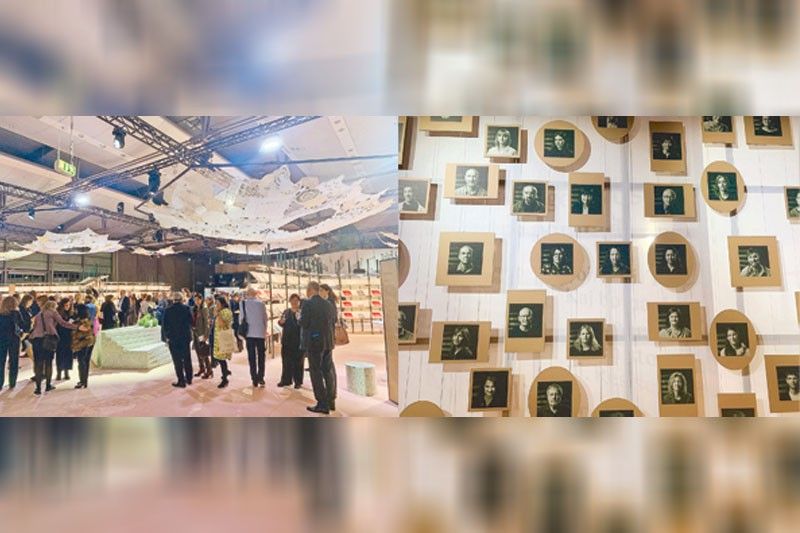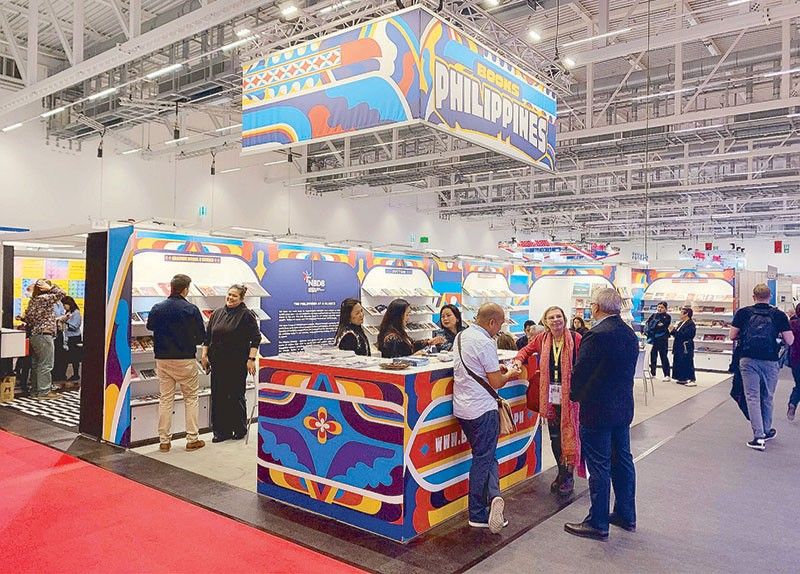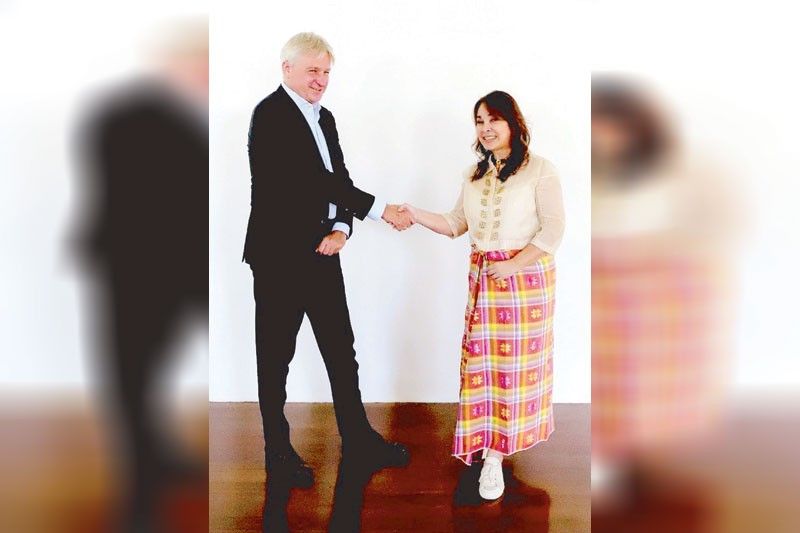The Philippines is Frankfurt Book Fair 2025 guest of honor

FRANKFURT, Germany — For the NCCA (National Commission for Culture and the Arts) team, the Frankfurt Book Fair was a blur of technical meetings, discussions and observations as to how the current Guest of Honour (GOH) country, Slovenia, made use of the spacious pavilion in promoting its literary DNA. There was also much strategizing with Juergen Boos, president and CEO of the Frankfurter Buchmesse (FBM) GmbH, and Simone Bühler, head of Guest of Honour Programme, as well as talks with reps from the 2024 Guest of Honour, Italy.
Since 1976, the FBM has been naming a Guest of Honour country whose publishing industry and other cultural products become the highlight of the fair. The GOH country is given a special pavilion, which features major publishers and other important industry representatives of the country. It usually takes a country four to five years to prepare for the privilege of being front and center at the Frankfurter Buchmesse as GOH. For the Philippines, which gets this distinction in 2025, the prep time is shorter, more pressureladen, with the weight of the publishing world upon its shoulders. But we all know how Filipinos excel in crunch time.
Besides, we want this, we dreamt of this, we’ve earned this.
It is essential for Philippine authors and publishers, the entire industry itself, to participate in such a prestigious platform that fosters intercultural exchange. Like our country’s participation in the Venice Biennale, which brings Filipino art and architecture to the spotlight, it is important that the Philippines becomes a participant in the global literary landscape. Our writers rock — and the rest of the world should know it.
This was according to Senate President Pro Tempore Loren Legarda, who was instrumental in the Philippines getting that coveted GOH gig.

“The privilege of being the Guest of Honour goes beyond the realm of publishing,” she pointed out. “It presents a unique platform to enhance our country’s reputation, leading to a positive impact on art and culture, and the branding of our expanding exports in other creative sectors such as film, music, architecture, as well as the contributions of our hard-working overseas Filipino workers in the labor and services sectors. It is also an opportunity for cultural discourse.”
It was late in 2015 when Karina Bolasco — then director of the Ateneo de Manila University Press and currently a National Book Development Board (NBDB) executive — presented the idea of participating in the fair, and the senator supported it all the way.
Bolasco said, “In 2016, Senator Loren went with us to Frankfurt to check out the book fair. When she found out that Indonesia was the Guest of Honour, the senator right away said, ‘If Indonesia can, we can too.’” Never did Bolasco and other Filipino publishers think of making a bid to be GOH. But Senator Legarda was determined. She met with Boos and his team, inviting them to Manila. She even revived the Consulate in Frankfurt, anticipating how essential this will be when the country gets its GOH status. Bolasco shared, “In July this year, we were told we won the bid for 2025, exactly 10 years after Indonesia.”
The senator explained, “As Guest of Honour, we will be in a unique, prominent position in the global arena to show our publishing industry’s creativity and intellectual prowess. I have worked tirelessly for this, together with then NBDB chair Neni Sta. Romana Cruz and board members Karina Bolasco and Ani Almario. We have finally clinched that honor and distinction thanks to the support and hard work of present NBDB chair Dante Francis Ang II and executive director Charisse Tugade.”
GOH project curator Patrick Flores observed how the Slovenian Pavilion did well to enhance the strengths of its writing practice, which pertains largely to philosophy and poetry. “These forms require a complex way of writing and reading, and Slovenia rightfully took a risk to make a plea for complexity amid the current technological climate of easy access to data and the populist tendency to simplify and elicit quick opinion. Slovenia, in fact, worked on a manifesto on complex reading; and I thought this was a compelling contribution.”

What is the curatorial team’s vision for the Philippine Pavilion in 2025? “We are trying to refine our approach from which the design will play out. I imagine it to address the sociocultural context, intellectual aspirations, as well as the feeling of generosity and hospitality. I would like to broaden the perspective on books as involving a dynamic relationship between reading and writing. This is a step away from the obsession with literary qualities policed by an establishment. We are rather interested in the integrities of practice at formal, material, and political levels; a writing and reading practice that is about sharing and inspiring.”
“As GOH, we are the country of focus,” explained Riya Brigino, co-director of the Philippines as Guest of Honour at the Frankfurt Book Fair 2025 committee. “Why participate in the fair? We want our writers to be more well-known in the publishing world. This will encourage our creators to take on grander projects, produce greater works. How important is choosing the right theme? Well, it is the bloodline, the spine and the brain of the entire project.”
For Slovenia this year, it was “Honeycomb of Words.” For Italy next year, it will be “Roots in the Future.” For us in 2025, it will be “Imagination Peoples the Air.” (It is lifted from a line from Jose Rizal’s Noli Me Tangere: “Night favors credulity and imagination peoples the air with specters.”)
“Everything will be anchored to the theme — exhibitions, brochures, the books that will be brought to Frankfurt. Because the theme embodies the spirit of our participation,” said Brigino. “And Rizal connects our country with Germany historically. The Noli was completed while Rizal was living in a house owned by Pastor Karl Ullmer in Wilhelmsfeld, Germany.”
The theme that not only encapsulates the wondrous variety of Philippine letters, its magic-realist aspect and its multicultural mindset, but also its deeply rooted ties to great minds like Rizal and Nick Joaquin, as well as its cultivation of forward-thinking authors of graphic novels, horror, sci-fi, and climate fiction.
Brigino lauded the efforts of the senator to put the Philippines on the international stage not just in art and architecture, but also in the literary world.
“Senator Loren believes that our artists and writers are at par with their counterparts overseas. Ngunit dahil may issue sa kahirapan, natatabunan ang ating brilliance sa larangan ng sining at panitikan. In her speeches, she always said na pinapahalagahan dapat ng gobyerno ang mga manlilikha. Just like in first world nations, we have our brilliant artists and writers — bakit hindi natin ipagmalaki?”
How our country fares in the world’s oldest, most prestigious book fair is a story for the next chapter.
* * *
The Philippines as Guest of Honour at the Frankfurt Book Fair 2025 is an inter-agency program of the National Commission for Culture and the Arts (NCCA), the National Book Development Board (NBDB), the Department of Foreign Affairs (DFA), and the office of Senate President Pro Tempore Loren Legarda.
The Frankfurt Book Fair is a five day annual event held every October in Frankfurt, Germany organized by Frankfurter Buchmesse GmbH, a subsidiary of the German Publishers and Booksellers organization. It draws about 7,000 exhibitors and over 200,000 visitors every year.



















